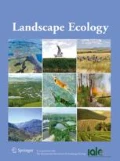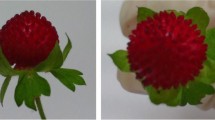Abstract
Context
Landscape ecology has traditionally been taught through theoretical classes or computer labs. On the other hand, field labs have been generally less used as a way of teaching landscape ecology concepts.
Objectives
We show that field labs with an inquiry-based approach, where students are involved in the investigation, are feasible for training students in landscape ecology. We evaluated how common field labs are in landscape ecology courses, and also their contribution for student learning.
Methods
We evaluated whether field labs are used in landscape ecology courses by scanning available syllabi. We also used outcomes from a course offered in Brazil to show how field labs can be integrated into landscape ecology courses.
Results
Only 18.2 % of the 44 syllabi we found had field labs. The case study developed in Brazil showed that field labs allowed students to develop important skills, including the ability to design field studies, choose appropriate scales of analysis, detect ecological patterns, and judge multiple hypotheses.
Conclusions
Field labs are still uncommon in landscape ecology courses, but they can be a useful tool to teach landscape ecology concepts and to help students developing the necessary skills to do research. We offer recommendations regarding how to incorporate field labs in landscape ecology courses.


Similar content being viewed by others
References
Almeida-Gomes M, Rocha CFD (2014) Landscape connectivity may explain anuran species distribution in an Atlantic forest fragmented area. Landscape Ecol 29:29–40
Beck CW, Blumer LS (2012) Inquiry-based ecology laboratory courses improve student confidence and scientific reasoning skills. Ecosphere 3:1–11
Coleman BD, Mares MA, Willig MR, Hsieh Y-H (1982) Randomness, area, and species richness. Ecology 63:1121–1133
Driver R, Asoko H, Leach J, Scott P, Mortimer E (1994) Constructing scientific knowledge in the classroom. Educ Res 23:5–12
Flores-Palacios A, García-Franco JG (2006) The relationship between tree size and epiphyte species richness: testing four different hypotheses. J Biogeogr 33:323–330
Forman RTT (1995) Land Mosaics: the ecology of landscapes and regions. Cambridge University Press, New York
Forman RTT, Godron M (1986) Landscape ecology. Wiley, New York
Gergel SE, Turner MG (2002) Learning landscape ecology: a practical guide to concepts and techniques. Springer, New York
Grandy R, Duschl RA (2007) Reconsidering the character and role of inquiry in school science: analysis of a conference. Sci Educ Neth 16:141–166
Leitão AB, Miller J, Ahern J, McGarigal K (2006) Measuring landscapes: a planner’s handbook. Island Press, Washington
Leon-Beck M, Dodick J (2012) Exposing the challenges and coping strategies of field-ecology graduate students. Int J Sci Educ 34:2455–2481
MacArthur RH, Wilson EO (1967) The theory of Island biogeography. Princeton University Press, New Jersey
Naveh Z, Lieberman AS (1984) Landscape ecology, theory and application. Springer, New York
NRC (2012) A framework for K-12 science education: practices, crosscutting concepts, and core ideas. The National Academies Press, Washington
Pearson S, Turner MG, Urban DL (1999) Effective exercises in teaching landscape ecology. In: Klopatek JM, Gardner RH (eds) Landscape ecological analysis: issues and applications. Springer, New York, pp 335–368
Prevedello JA, Vieira MV (2010) Plantation rows as dispersal routes: a test with didelphid marsupials in the Atlantic Forest, Brazil. Biol Conserv 143:131–135
Sternberg RJ (1999) Intelligence as developing expertise. Contemp Educ Psychol 24:359–375
Taylor PD, Fahrig L, Henein K, Merriam G (1993) Connectivity is a vital element of landscape structure. Oikos 68:571–572
Tischendorf L, Fahrig L (2000) On the use and measurement of landscape connectivity. Oikos 90:7–19
Turner MG, Gardner RH, O’Neill RV (2001) Landscape ecology in theory and practice: pattern and process. Springer, New York
Williams CB (1943) Area and the number of species. Nature 152:264–267
Acknowledgments
We thank the Brazilian students that attended the two courses, and the State University of Rio de Janeiro, Federal University of Rio de Janeiro and Nicholas J. Locke of the Reserva Ecológica de Guapiaçu (REGUA), for the support for the courses. Financial support was provided by PNPD-CAPES (scholarship to M. A. Gomes, Process No. 2923/2011 ), FAPESP (scholarship to J. A. Prevedello, Process No. 2013/03457-1) and CNPq (research fellowship to JP Metzger, Process No. 307934/2011-0). We also thank Amanda Northrop for reviewing the English on a previous version of the manuscript.
Author information
Authors and Affiliations
Corresponding author
Electronic supplementary material
Below is the link to the electronic supplementary material.
Rights and permissions
About this article
Cite this article
Almeida-Gomes, M., Prevedello, J.A., Scarpa, D.L. et al. Teaching landscape ecology: the importance of field-oriented, inquiry-based approaches. Landscape Ecol 31, 929–937 (2016). https://doi.org/10.1007/s10980-016-0338-1
Received:
Accepted:
Published:
Issue Date:
DOI: https://doi.org/10.1007/s10980-016-0338-1




